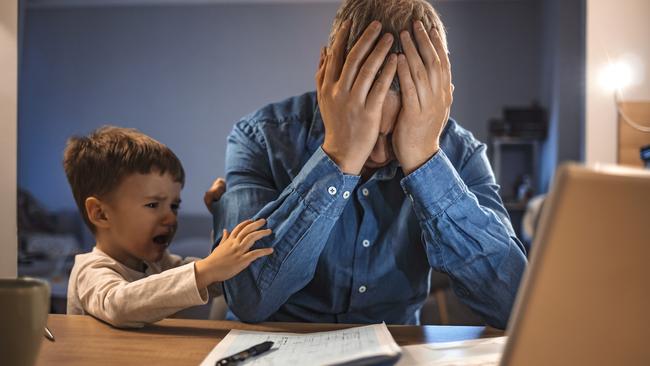The very real and extreme damage of suppressed emotions, especially for men
Many men can’t directly express their distress or anxiety, but repressing feelings can cause extreme anxiety and chronic stress — which can ultimately lead to physical diseases and symptoms.

Many men repress emotions, leading to anxiety and health issues, but ignoring feelings creates a spiral of isolation and relationship problems, Susanna Abse says, a psychoanalytic psychotherapist for more than 30 years. Below she explains how much damage suppressed emotions can cause, especially for men.
Men often manage their distress in unhealthy ways
Many men can’t directly express their distress or anxiety. Some aren’t able to articulate what’s wrong even to themselves or locate the source of their misery. “They just have a vague sense of unease or unhappiness,” says Abse. The problem with repressing feelings is that they don’t stay repressed. “They come out sideways.” So then men try to damp down those feelings with alcohol or drugs, or inappropriate sexual behaviour. “You look for routes to get away from your own feelings that in the end create more problems,” she says. “If you find yourself drinking not just socially but every night and you feel compelled, treat that as a symptom. Those are not just habits — there’s a red flag being waved.” Find a way of having more of an emotional conversation with yourself, Abse advises, whether by talking to friends or your partner. If not, foster healthy habits — sport and exercise can provide an outlet for some of those feelings.
It can lead to anxiety issues, stress and poor health
Repressing feelings and being unable to make sense of their emotions can lead to extreme anxiety and chronic stress — which can ultimately lead to physical diseases and symptoms. “If you don’t find a way to express feelings they will lead to other symptoms, one of which might be anxiety,” says Abse, author of Tell Me the Truth About Love. It can, she says, also lead to depression or addictive coping strategies such as alcoholism.

“All of these arise out of unresolved internal issues that aren’t processed.” Men might identify what they feel as “chronic stress”, but, as Abse says, “if you’re under fire in Ukraine and you feel chronically stressed, it’s an appropriate response to your environment. If life is pretty ordinary and you’re constantly chronically stressed and not sleeping, then it’s probably not what we’d call an appropriate response. It’s coming from inside rather than outside.” She adds: “Take yourself seriously. Think not just about your physical health but your mental health. Pay attention to your emotional life.”
Ignoring emotions can make ‘strong’ men feel lonely: friends are important
“The men that I see, many are very successful and have done amazing things, climbed Mount Everest sometimes in reality and sometimes in terms of their careers — men who absolutely cannot show any vulnerability,” Abse says. “They’ve had to put on armour, a fake strength.” They fear that if they shared their “weak feelings” or emotional “needs” they’d be humiliated, not loved and cared for. “There’s a lot of shame for these men.” But it makes it hard to be close to anyone. “Lots of men have no friends and become very isolated,” she says. “Real strength involves recognising one’s vulnerability, being comfortable with it, being able to show it to other people.” How to begin? Even if it’s hard to talk, “make sure you take care of your friendship groups. Spend time with, value and cultivate friends.”
It’s terrible for their relationship/marriage
Men who can’t admit that they’re anxious or sad often retreat from their family and partner. “So often, men double down on what they’re already doing. They really bury themselves in work. They get so anxious and obsessive about it. They think they’re doing it for their family, and their family doesn’t seem to be very happy with them.”

Their sense of feeling criticised means they spend yet more time at the office. “It’s a spiral.” Be curious, she says. Ask yourself, “Why am I feeling like this? Why is my partner cross? Why is my partner not interested in having sex with me?” The first step is simple, she says. “Work less. Spend more time at home. That is an absolute key thing. It all starts with coming home a bit earlier.”
Suppressed feelings can lead to a crisis
When women have an emotional problem there’s often a quest to find a solution, Abse says. They might discuss it with friends. “Unfortunately, men usually hit some sort of crisis. They might get into a fight or sacked from work because they’re drinking too much, or all their pent-up rage gets expressed by attacking their relationship and having an affair.” Suppressing feelings that something is unfair, or they’re not loved, understood or considered often leads to anger, and repression of anger leads to depression, she adds. Men often don’t believe that things can improve, but they can. “Even a crisis, like an affair, can lead to a new beginning. Men need to tell themselves, ‘Things can change.’ But to keep doing the same thing you’ve been doing probably won’t bring about that change.”
Bottling things up sets a bad example for sons
Men who struggle to express, articulate or make sense of their emotions may not have had a helpful role model in their own father, Abse says. However, she adds: “If you’re lucky and you’ve got a dad who’s got a good integration between the sense of himself as a man, as potent and out there in the world, and able to feel strong and connected, and your dad’s also somebody who washed your hair as a child and nurtured you, then obviously you’re more likely to grow up to be a man who’s comfortable with feelings and vulnerability as well as the more ‘muscular’ aspects of being a man.”

It’s the case for your sons too. “Often men feel shut-out of family life, disempowered and inadequate, which makes them feel ashamed, and this makes them retreat further.” But, she says, if you can take pleasure in family life, be more present and attentive, show through your actions that you care, you’ll get more care back. “Fathers are so important to their children. Men often don’t realise how much.”
The Times




To join the conversation, please log in. Don't have an account? Register
Join the conversation, you are commenting as Logout